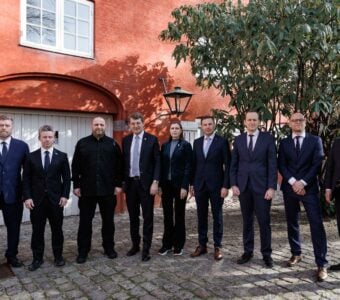Ukraine to receive UAH 128 million for digitalization of services provided by Digital Transformation Ministry

The Government of Sweden and the United Nations Development Programme (UNDP) are providing funding to support electronic and inclusive services for vulnerable groups in Ukraine.
A three-year project entitled "Digital, Inclusive, Accessible: Supporting the Digitization of Public Services in Ukraine" (DIA Support) with a total budget of UAH 128 million (approximately US$ 4.5 million) is to help the ministry implement joint goals and initiatives in digital formats. The project, which aims to improve the quality of citizens' access to electronic administrative and social services, was launched by the Ministry of Digital Transformation and the United Nations Development Programme (UNDP) in Ukraine, with support from the Swedish Embassy.
Deputy Prime Minister and Minister of Digital Transformation Mykhailo Fedorov said the Digital Transformation Ministry team has been working for a year to make Ukraine the most convenient state in the world.
"Our goal is to create affordable and fast online services for every Ukrainian, regardless of their digital skills," Fedorov said. "With the support of our partners, we plan to implement a range of administrative reforms that will eradicate corruption. We're preparing inclusive and convenient services that will make life easier for all vulnerable groups: retirees, people with disabilities, and others."
The project will focus on:
- providing comprehensive services for vulnerable groups of citizens;
- developing software for services and related equipment;
- creating sustainable infrastructure and access to information and communication technologies;
- raising the level of digital literacy and cyber hygiene, digital education programmes;
- conducting communication campaigns about electronic services, and providing support for users of services;
- developing a system for improving people's skills and regulatory framework;
- creating educational and training programmes for public authorities, Administrative Service Centres, and so on;
- cooperating with the office of the Ukrainian Parliament Commissioner for Human Rights.
Swedish Ambassador to Ukraine Tobias Thyberg said Ukraine had made significant strides in digitalising the state and its functions over the past few years.
"This project will build on those successes by broadening and deepening the reach of the state's services, giving more people access to convenient and fast digitalised administrative services in Ukraine," Thyberg said.
The support programme will help bridge the digital divide between generations and between groups of Ukrainians from different social groups. Together with its partners, the ministry will develop new digital solutions for:
- seniors and retirees;
- persons with disabilities;
- people living below the poverty line;
- people living in rural areas;
- young people living in conflict-affected areas;
- ethnic minorities (especially the Roma population) and IDPs;
- veterans returning to civilian life.
Appropriate digital solutions for these target groups are likely to differ from those designed for users living in larger cities, who have average or above-average incomes and round-the-clock access to good quality Internet connections.
The task of the project is to identify appropriate, effective solutions, and then develop and test them with different user groups to achieve maximum user convenience and efficiency for online or mobile solutions.
UNDP Resident Representative in Ukraine Dafina Gercheva said that digitalisation, while equalling opportunities on the surface, can also increase inequalities if certain groups – such as the elderly, those in rural areas with poor communications services, and those in poverty – are not taken into account.
"The DIA Support project has inclusivity and gender-responsiveness built into its design, so that in digitalising its state services, Ukraine will leave no one behind," Gercheva said.
The DIA Support project draws on UNDP's many years of experience in Ukraine in two areas: administrative service reform and reformatting and digitizing public administration.

















































